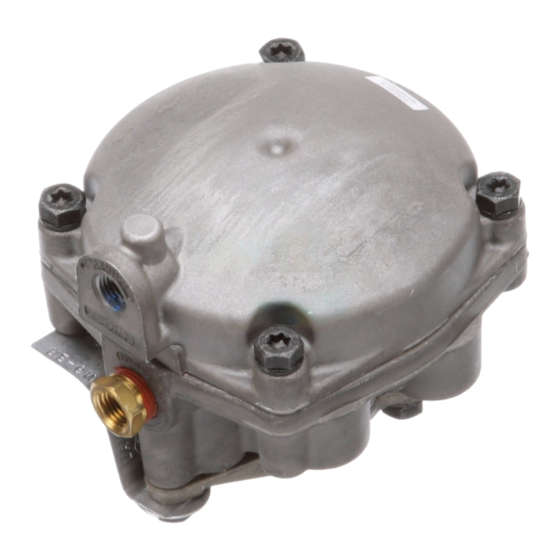BENDIX RE-6NC Podręcznik - Strona 6
Przeglądaj online lub pobierz pdf Podręcznik dla Jednostka sterująca BENDIX RE-6NC. BENDIX RE-6NC 13 stron. Relay valves

RE-6
™
& RE-6NC
™
VALVES EMERGENCY
APPLICATION
(Trailer air system charged to normal operating pressure).
Venting the emergency supply line to atmosphere will
cause the emergency portion of the relay emergency
valve to apply full trailer reservoir pressure to the trailer
service chambers. If the emergency supply line pressure
is reduced to approximately 20 psi, a graduated trailer
air chamber application will occur. The rate of this brake
application will depend upon the rate of pressure loss in
the emergency supply line.
In an emergency, air would be removed from the emergency
supply line port of the RE-6
the emergency piston to return to its released position.
FALLING
FROM FULL
SYSTEM
PRESSURE
FULL SYSTEM
PRESSURE
™
FIGURE 11 RE-6
& RE-6NC
APPLICATION
When the emergency piston moves back to its released
position, the seal is open between the emergency piston
and the inlet / exhaust valve. The open valve allows air to
fl ow from the reservoir, past the shoulder in the emergency
piston, past the inlet / exhaust valve, past the underside
of the relay piston moving on to the service chambers
creating an emergency application. Full reservoir pressure
will be applied to the service chambers and will not be
removed until the pressure in the emergency port of the
™
™
RE-6
or RE-6NC
valve reaches at least 60 psi. When
the emergency port pressure reaches any pressure above
60 psi, the emergency piston and inlet / exhaust valve will
move from the seat of the relay piston allowing the service
chambers to exhaust the air. Refer to Figure 11.
If the dolly is not equipped with parking actuators (such as
spring brakes), the wheels should be blocked to prevent
trailer movement.
6
™
™
and RE-6NC
valves, allowing
EMERGENCY
SUPPLY LINE
™
RELAY VALVE EMERGENCY
TO RELEASE AN EMERGENCY APPLICATION
™
™
RE-6
& RE-6NC
VALVES
Charge the trailer air system or:
A. For trailers equipped with standard brake chambers,
block wheels and drain trailer reservoir.
B. For trailers equipped with spring brake chambers,
block wheels and mechanically release spring brake
chambers via the mechanical release mechanism (for
specifi c instructions, refer to manufacturers service
literature.)
WARNING! PLEASE READ AND FOLLOW
THESE INSTRUCTIONS TO AVOID PERSONAL
INJURY OR DEATH:
When working on or around a vehicle, the following
general precautions should be observed at all times.
1. Park the vehicle on a level surface, apply the
parking brakes, and always block the wheels.
Always wear safety glasses.
2. Stop the engine and remove ignition key when
working under or around the vehicle. When
working in the engine compartment, the engine
should be shut off and the ignition key should be
removed. Where circumstances require that the
engine be in operation, EXTREME CAUTION should
be used to prevent personal injury resulting from
contact with moving, rotating, leaking, heated or
electrically charged components.
3. Do not attempt to install, remove, disassemble
or assemble a component until you have read
and thoroughly understand the recommended
procedures. Use only the proper tools and observe
all precautions pertaining to use of those tools.
4. If the work is being performed on the vehicle's
air brake system, or any auxiliary pressurized air
systems, make certain to drain the air pressure
from all reservoirs before beginning ANY work
on the vehicle. If the vehicle is equipped with an
AD-IS
®
air dryer system or a dryer reservoir module,
be sure to drain the purge reservoir.
5. Following the vehicle manufacturer's recommended
procedures, deactivate the electrical system in a
manner that safely removes all electrical power
from the vehicle.
6. Never exceed manufacturer's recommended
pressures.
7. Never connect or disconnect a hose or line
containing pressure; it may whip. Never remove
a component or plug unless you are certain all
system pressure has been depleted.
